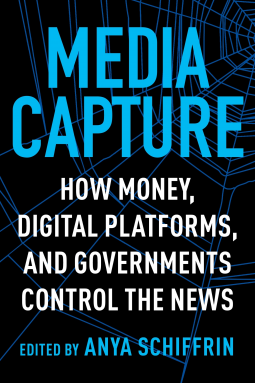
Media Capture
How Money, Digital Platforms, and Governments Control the News
by Edited by Anya Schiffrin
This title was previously available on NetGalley and is now archived.
Send NetGalley books directly to your Kindle or Kindle app
1
To read on a Kindle or Kindle app, please add kindle@netgalley.com as an approved email address to receive files in your Amazon account. Click here for step-by-step instructions.
2
Also find your Kindle email address within your Amazon account, and enter it here.
Pub Date Jun 22 2021 | Archive Date Sep 29 2021
Talking about this book? Use #MediaCapture #NetGalley. More hashtag tips!
Description
This book features pathbreaking analysis from journalists and academics of the changing nature and peril of media capture—how formerly independent institutions fall under the sway of governments, plutocrats, and corporations. Contributors including Emily Bell, Felix Salmon, Joshua Marshall, Joel Simon, and Nikki Usher analyze diverse cases of media capture worldwide—from the United Kingdom to Turkey to India and beyond—many drawn from firsthand experience. They examine the role played by new media companies and funders, showing how the confluence of the growth of big tech and falling revenues for legacy media has led to new forms of control. Contributions also shed light on how the rise of right-wing populists has catalyzed the crisis of global media. They also chart a way forward, exploring the growing need for a policy response and sustainable models for public-interest investigative journalism. Providing valuable insight into today’s urgent threats to media independence, Media Capture is essential reading for anyone concerned with defending press freedom in the digital age.
Advance Praise
"This book is a remarkable achievement. For scholars and concerned citizens alike, it promises to be a key milestone in the ongoing debates about the uncertain future of news. At a moment when our democratic institutions are under assault and journalism is withering away, the essays featured in Schiffrin's wonderful volume are especially timely. Anyone who cares about the future of journalism—and our democracy—should read this important book!"
--Victor Pickard, author of America's Battle for Media Democracy: The Triumph of Corporate Libertarianism and the Future of Media
Available Editions
| EDITION | Other Format |
| ISBN | 9780231188838 |
| PRICE | $32.00 (USD) |
Average rating from 7 members
Featured Reviews
It reads very fast. In fact, the topics covered in the book are very timely and give a good look at the media environment in the United States.
While the main focus is on the United States, the media, and how the media and big companies enter into - to put it mildly - unpleasant alliances in the name of visibility and profit, this book is not hate. On the contrary, the articles and essays collected in this book are by authors who have extensive experience and know what they are talking about.
The authors draw from their experience and participate in media life. There are interesting data and tips for the whole field.
Thanks to the publisher, Columbia University Press, for giving me a glimpse via NetGalley of this book before it is published.
 Michael W, Reviewer
Michael W, Reviewer
This was a good book on media and how the news we get is controlled. The book covers all the media from newpapers, tv news and social media news. There is given a clear view of how govenment and media combine to controil what we see and watch. They can control our emotions and values by showing what they deem necessay for the public to see. This book is quite an eyeopener.I recpmmend this book for all who question what we see and hear and question. I received this book as an ARC from Netgalley as a reviewer but my thoughts and opinions are my own.
DNF. 3.5 stars.
I enjoyed this book to a degree, it made for a fast read detailing the influence of technology in America.
I did, however, find some aspects and ideas repetitive which meant I did not finish the book. It takes a far more academic form than the title would suggest - I would imagine it’s good for research, it is just not what I was looking for at this exact moment in time.
Many thanks to NetGallery for providing me with this in exchange for an honest review :)
 Kim C, Educator
Kim C, Educator
Media Capture gives an insider look at the issue of media takeovers by entities that have an interest in manipulating what information is fed to the public. The book is a collection of chapters written by different authors, all from various fields involved in the media.
Each chapter examines one aspect of media capture. Taken together, they give an overall picture of how media is influenced by outside forces worldwide. It’s not just social media, but also print and television, etc. The influencers can be government or private. All have their own agenda and message.
The picture looks bleak and I found myself feeling a bit overwhelmed with the extent of media capture happening globally. It is something to think about long and hard. Which media outlets are free from outside influences? Which have been ‘captured’ by interests whose goal is not specifically to deliver straight news? As media consumers, it is up to each of us to carefully vet each source that we consult. This becomes more difficult as the ownership of each outlet becomes murkier.
The authors are journalists and also scholars who study this phenomenon. Their combined experience brings a thorough picture to the reader. There are chapters about the U.S., but also other countries such as India, Turkey, and the UK. The chapters document the many alliances between the media and government in these countries. It is written in a documentary format and does not seem to take one side or the other. As a reader, I think I bring my own biases to the story. To me, the marriage of government and media is distressing. So, I may interpret some things as negative, while another reader may come away with a different perspective.
Overall, this book paints a picture that more media consumers need to be aware of. Most of us are aware of the influence of social media, but we also need to pay attention to the more traditional media, such as newspapers. The affects of outside influence can creep in anywhere. It is up to the consumers to be wary of our sources of information these days.
Highly recommended if you are interested in the truth behind media capture and how this can influence public opinion.
Readers who liked this book also liked:
JUNO
Arts & Photography, Comics, Graphic Novels, Manga, Travel
Silvia Moreno-Garcia
Historical Fiction, Literary Fiction, Sci Fi & Fantasy


















